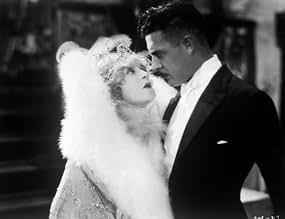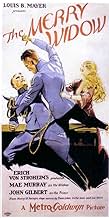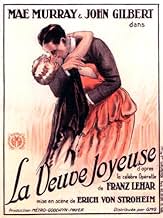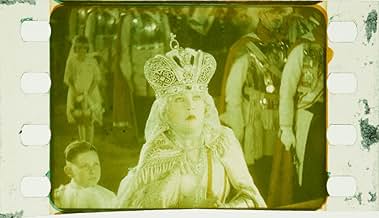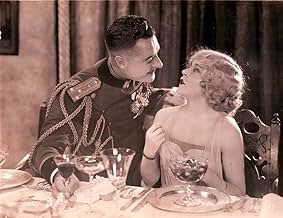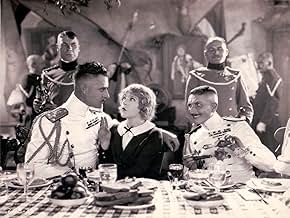AVALIAÇÃO DA IMDb
7,2/10
2,7 mil
SUA AVALIAÇÃO
Adicionar um enredo no seu idiomaA prince must woo the now-wealthy dancer he once abandoned, to keep her money in the country in order to keep it from crashing economically.A prince must woo the now-wealthy dancer he once abandoned, to keep her money in the country in order to keep it from crashing economically.A prince must woo the now-wealthy dancer he once abandoned, to keep her money in the country in order to keep it from crashing economically.
- Direção
- Roteiristas
- Artistas
- Prêmios
- 3 vitórias no total
Gertrude Bennett
- Hard-Boiled Virginia
- (não creditado)
Bernard Berger
- Boy
- (não creditado)
Sidney Bracey
- Danilo's Footman
- (não creditado)
Estelle Clark
- French Barber
- (não creditado)
Albert Conti
- Danilo's Adjutant
- (não creditado)
D'Arcy Corrigan
- Horatio
- (não creditado)
Joan Crawford
- Ballroom Dancer
- (não creditado)
Xavier Cugat
- Orchestra Leader
- (não creditado)
Anielka Elter
- Blindfolded Musician
- (não creditado)
Dale Fuller
- Sadoja's Chambermaid
- (não creditado)
Clark Gable
- Ballroom Dancer
- (não creditado)
Avaliações em destaque
Stroheim's take on the familiar story is filled with his customary pomp and spectacle while never losing sight of the love story at its core. It's something of a slog at over two hours long though, and Gilbert's royal prince comes across as something of a sleaze at times. However, Roy D'Arcy makes a wonderfully hissable villain as the scheming Crown Prince Mirko (a role von Stroheim originally ear-marked for himself).
This is the kind of silent film that is so enjoyable to watch. Huge budget with a great cast. In the climatic dance sequence, where the "Merry Widow" dances, both Clark Gable and Myrna Loy, both unknowns at the time, were extras.
Erich von Stroheim has played a neat little trick with 'The Merry Widow'. The first half of the movie plays out like a quirky royal-romance comedy. There are plenty of scenes and gags that could belong to the best comedic works of Howard Hawks. In the second half, the tone changes into more melodramatic, yet the tonal change doesn't take the viewer out of the movie. It actually gives that perfect feel of a mental hangover after the pure love has been ripped into shreds by the cruel world. But the whole film has some sinister undertone - like something is about to happen, but you can't be sure, what it is. Von Stroheim constantly leads his viewers somewhere, allows them to guess, and then - BAM.
John Gilbert is likable as charming Prince Danilo. Mae Murray balances between hammy and sometimes very good performance (someone said, that von Stroheim made actress out from Murray). But Roy D'Arcy is hamming his Crown Prince Mirko up. In a good way. His portrayal of a monocle-wearing sleazy villain blows all previous Erich von Stroheim's performances out of the water.
Like any other von Stroheim's movie, 'The Merry Widow' also suffered from studio interference (some scenes that were cut were quite steamy, probably even for today's standards). I would want to say that 'The Merry Widow' is von Stroheim's weakest work, but again, we can't see his whole vision. The sets are beautiful. Camerawork and editing also something of their own league. Again, you have to admire von Stroheim's attention to small details - lecherous Baron Sadoja's obsession with women's legs, who himself has sick legs.
John Gilbert is likable as charming Prince Danilo. Mae Murray balances between hammy and sometimes very good performance (someone said, that von Stroheim made actress out from Murray). But Roy D'Arcy is hamming his Crown Prince Mirko up. In a good way. His portrayal of a monocle-wearing sleazy villain blows all previous Erich von Stroheim's performances out of the water.
Like any other von Stroheim's movie, 'The Merry Widow' also suffered from studio interference (some scenes that were cut were quite steamy, probably even for today's standards). I would want to say that 'The Merry Widow' is von Stroheim's weakest work, but again, we can't see his whole vision. The sets are beautiful. Camerawork and editing also something of their own league. Again, you have to admire von Stroheim's attention to small details - lecherous Baron Sadoja's obsession with women's legs, who himself has sick legs.
A romantic Prince from tiny Monteblanco attempts to woo THE MERRY WIDOW who once loved him when she was a poor dancer.
Erich von Stroheim, the Teutonic genius who marched through Hollywood's Silent Days like a conquering general, had his final directorial stint at MGM Studios producing this lavish & brilliant film based on the operetta by Franz Lehár. The visuals are striking, with sets that look like actual locations--a mountaintop village; the Castellano Cathedral; Maxim's in Paris--and the occasional bizarre touch--the blindfolded musicians sharing the Prince's seduction bed, for example--which von Stroheim relished. The acting is flawless, with no need for dialogue. The actors' faces speak all that need be said.
Mae Murray & John Gilbert portray the passionate lovers whom Fate (and the plot) contrives to keep apart so successfully. Miss Murray (she and the director loathed each other) powerfully portrays a street-wise performer who, through a series of heartbreaks, becomes a vastly wealthy woman. Gilbert expertly plays a prince whose charm has always gotten him his way. Their scenes together, most particularly the waltz sequences, fairly blaze with unrequited sensual longing and desire.
While it is entertaining to wonder what von Stroheim would have done with the role, it is difficult to imagine anyone better than Roy D'Arcy as the simpering, lusting, sneering Crown Prince; he is pure villainy personified and his eventual fate is absolutely justified. Josephine Crowell gives a fine performance as the Queen. Tully Marshall, one of von Stroheim's favorite character actors, adds another portrait to his gallery of grotesques, this time playing a crippled baron with a foot fetish.
The wonderful organ score which accompanies the film was arranged & performed by Dennis James.
MGM would tackle THE MERRY WIDOW again nine years later and produce a vastly different film, this time directed by Ernst Lubitsch and starring Maurice Chevalier & Jeanette MacDonald.
Erich von Stroheim, the Teutonic genius who marched through Hollywood's Silent Days like a conquering general, had his final directorial stint at MGM Studios producing this lavish & brilliant film based on the operetta by Franz Lehár. The visuals are striking, with sets that look like actual locations--a mountaintop village; the Castellano Cathedral; Maxim's in Paris--and the occasional bizarre touch--the blindfolded musicians sharing the Prince's seduction bed, for example--which von Stroheim relished. The acting is flawless, with no need for dialogue. The actors' faces speak all that need be said.
Mae Murray & John Gilbert portray the passionate lovers whom Fate (and the plot) contrives to keep apart so successfully. Miss Murray (she and the director loathed each other) powerfully portrays a street-wise performer who, through a series of heartbreaks, becomes a vastly wealthy woman. Gilbert expertly plays a prince whose charm has always gotten him his way. Their scenes together, most particularly the waltz sequences, fairly blaze with unrequited sensual longing and desire.
While it is entertaining to wonder what von Stroheim would have done with the role, it is difficult to imagine anyone better than Roy D'Arcy as the simpering, lusting, sneering Crown Prince; he is pure villainy personified and his eventual fate is absolutely justified. Josephine Crowell gives a fine performance as the Queen. Tully Marshall, one of von Stroheim's favorite character actors, adds another portrait to his gallery of grotesques, this time playing a crippled baron with a foot fetish.
The wonderful organ score which accompanies the film was arranged & performed by Dennis James.
MGM would tackle THE MERRY WIDOW again nine years later and produce a vastly different film, this time directed by Ernst Lubitsch and starring Maurice Chevalier & Jeanette MacDonald.
The Merry Widow was first seen by American audiences on Broadway during the 1907-08 season where it ran for 416 performances. For those of us who know it primarily from the sound films with first Maurice Chevalier and Jeanette MacDonald and later Fernando Lamas and Lana Turner, this version will be quite interesting. Let's just say that what was put in the talkies was a lot closer to the stage production. Erich Von Stroheim who directed this film added quite a bit to the story. In fact in the end it isn't quite so merry.
Most of the film is taken up with just how Mae Murray became The Merry Widow. She's an American dancer who is stranded in the remote Balkan kingdom of Monteblanco which is ruled by King George Fawcett. In line for the throne is the rakish Roy D'Arcy, a Snidely Whiplash villain if there ever was one. Behind him is his cousin John Gilbert playing Prince Danilo.
Murray comes to the attention of both men, Gilbert actually falls for her, D'Arcy would like an occasional roll in the hay, but marry her? There's a third guy out there in Tully Marshall who is the wealthiest man in the kingdom and it's principal banker. He leaves and the whole place goes into receivership. Marshall's an old dude with some alternative sexual interests that Von Stroheim exploits to the fullest on screen and he'd like a young trophy wife and Murray fills the bill.
She does become a wife ever so briefly and then of course the Merry Widow having had her fill of royalty. But now that she holds the Monteblanco purse strings, D'Arcy has taken a renewed interest in her and maybe she just might be a suitable queen.
I think you can see where this is going though Von Stroheim does tease us a bit with some possible alternatives before the film concludes. The audience of 1925 saw one lavish production that nearly broke the new Metro-Goldwyn studio. We only see about half the footage he shot if that.
One thing that Metro did not have to worry about was a soundtrack. The music of The Merry Widow was very familiar to the American public and it's played on the organ throughout the film. Young contract players Joan Crawford and Clark Gable are extras in the ballroom scene and good luck in spotting them. Although in the Citadel film series book on The Films Of Clark Gable there is a still from The Merry Widow where Gable is pointed out.
I'm sure John Gilbert little dreamed that in six years Gable would be supplanting him as the number one leading man at MGM. But in The Merry Widow he's a stalwart and resolute Danilo and Mae Murray actually does suggest a bit of what Jeanette MacDonald's performance would be in the first sound remake.
In the fate of what happens to D'Arcy's character, Von Stroheim opts for some realism in terms of the European scene of the past 25 years or so before the film debuted. In fact very little of the happy tone of The Merry Widow is preserved here. The film given how Murray got her millions ought to be retitled, The Trophy Widow.
Still it's an interesting alternative to the normal operetta productions we're used to seeing.
Most of the film is taken up with just how Mae Murray became The Merry Widow. She's an American dancer who is stranded in the remote Balkan kingdom of Monteblanco which is ruled by King George Fawcett. In line for the throne is the rakish Roy D'Arcy, a Snidely Whiplash villain if there ever was one. Behind him is his cousin John Gilbert playing Prince Danilo.
Murray comes to the attention of both men, Gilbert actually falls for her, D'Arcy would like an occasional roll in the hay, but marry her? There's a third guy out there in Tully Marshall who is the wealthiest man in the kingdom and it's principal banker. He leaves and the whole place goes into receivership. Marshall's an old dude with some alternative sexual interests that Von Stroheim exploits to the fullest on screen and he'd like a young trophy wife and Murray fills the bill.
She does become a wife ever so briefly and then of course the Merry Widow having had her fill of royalty. But now that she holds the Monteblanco purse strings, D'Arcy has taken a renewed interest in her and maybe she just might be a suitable queen.
I think you can see where this is going though Von Stroheim does tease us a bit with some possible alternatives before the film concludes. The audience of 1925 saw one lavish production that nearly broke the new Metro-Goldwyn studio. We only see about half the footage he shot if that.
One thing that Metro did not have to worry about was a soundtrack. The music of The Merry Widow was very familiar to the American public and it's played on the organ throughout the film. Young contract players Joan Crawford and Clark Gable are extras in the ballroom scene and good luck in spotting them. Although in the Citadel film series book on The Films Of Clark Gable there is a still from The Merry Widow where Gable is pointed out.
I'm sure John Gilbert little dreamed that in six years Gable would be supplanting him as the number one leading man at MGM. But in The Merry Widow he's a stalwart and resolute Danilo and Mae Murray actually does suggest a bit of what Jeanette MacDonald's performance would be in the first sound remake.
In the fate of what happens to D'Arcy's character, Von Stroheim opts for some realism in terms of the European scene of the past 25 years or so before the film debuted. In fact very little of the happy tone of The Merry Widow is preserved here. The film given how Murray got her millions ought to be retitled, The Trophy Widow.
Still it's an interesting alternative to the normal operetta productions we're used to seeing.
Você sabia?
- CuriosidadesWhile filming the climactic ballroom scene, Erich von Stroheim noticed an extra whose costume was not adjusted to his liking. He stepped off the high camera platform on which he was standing, fell, and broke his leg. He directed the rest of the film from a reclining chair while his leg healed.
- Erros de gravaçãoA title card reads "a prince has a duty to his country higher then [sic] his duty to himself" - a grammatical error unusual for such a prestigious studio as MGM.
- Citações
Prince Danilo Petrovich: Where the devil did you get these pictures?
Danilo's Adjutant: From my barber--he said he got them in Paris.
- Cenas durante ou pós-créditosThe credits state that the film is "personally directed by" Erich von Stroheim.
- Versões alternativasThe version shown on the Turner Classic Movies (TCM) channel has the musical score arranged by Dennis James and performed by him on a Möller pipe organ. It is shown at a proper silent movie speed and runs 137 minutes.
- ConexõesEdited into Histoire(s) du cinéma: Seul le cinéma (1994)
Principais escolhas
Faça login para avaliar e ver a lista de recomendações personalizadas
- How long is The Merry Widow?Fornecido pela Alexa
Detalhes
- Data de lançamento
- País de origem
- Idioma
- Também conhecido como
- The Merry Widow
- Locações de filme
- Empresas de produção
- Consulte mais créditos da empresa na IMDbPro
Bilheteria
- Orçamento
- US$ 592.000 (estimativa)
- Tempo de duração
- 2 h 17 min(137 min)
- Cor
- Mixagem de som
- Proporção
- 1.33 : 1
Contribua para esta página
Sugerir uma alteração ou adicionar conteúdo ausente

